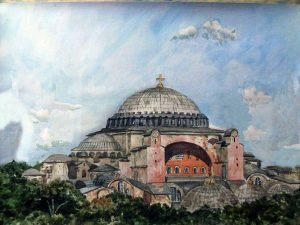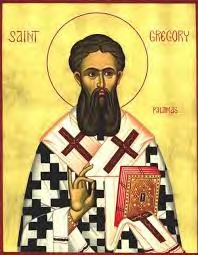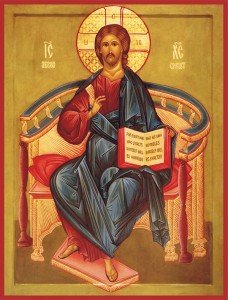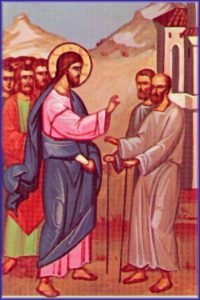TOPIC: Theology of Liturgy
By Len Mier
Thy Kingdom Come: Social Justice and Salvific Outlook in the Anaphora of St. Basil the Great Part 3
This is a continuation of the thoughts that Len had on the Anaphora of St. Basil the Great.

Mystical Supper
St Basil goes on to tell of salvation’s history that “when the fullness of time had come, you spoke to us through your own Son, the very one through whom you created the ages. Although he is the reflection of your glory and the express image of your person, sustaining all things by his powerful word… that he emptied himself taking on the form of a slave…that he might conform us to the image of his glory.” (Catholic et al., 2006)
St Basil finishes his recounting of salvation history with the consecration of the Eucharistic elements into the Divine Body and Blood of our Savior. This culminates with the anamnesis where we remember all that He has done for our salvation, making the moment real for us at the present time.
From this point forward in the anaphora, the intercessions, the focus begins to beseech God in prayer for blessings and care for all mankind. This portion of the anaphora starts out, “Rather, may we obtain mercy and grace together with all your saints who have pleased you since time began.”(Catholic et al., 2006) If we are to believe that we are transformed by the Eucharist lying on the altar, which we are to receive, then we must believe that we are called to give mercy and favor to those around us. St Basil goes on to list in much detail those things we need to do and people for whom we are to pray.
“These petitions are cosmic, ecclesiological, and eschatological in focus as they concern ‘All of God’s creation, all salvation, all fulfillment.’ It is within such a spiritually profound context that particular people prepare to commune in and with a Body much larger than themselves in a fashion that should transform every dimension of their life and world.”(LeMasters, 2015)
Likewise hearing those petitions we are called to do the things for which we pray. By doing Philanthropia for our fellowman, just as God did for us, we are now transformed by the Eucharist we are to receive, we become transformed in to that which we partake. In fulfilling the petitions we just prayed we are bringing about salvation on this side of the Kingdom and making the other side of the Kingdom real and present. “In order to pray such socially charged petitions with integrity, the members of the Church must enact the very Philanthropia and compassion for which they give thanks and pray.”(LeMasters, 2015) We as believers are called to do what we pray in liturgy. This makes liturgy Philanthropia also.
As St Basil tells his listeners in his homily to the rich:
You showed no mercy; it will not be shown to you. You opened not your house; you shall be expelled from the Kingdom. You gave not your bread; you will not receive eternal life. (Schroeder, 2009)
St Basil called this the Philanthropia to others the same as the example of Christ’s Philanthropia and his kenotic self-emptying for the salvation of mankind as opening phrases in the anaphora state.
Conclusion
St Basil with his keen sense of care and concern for the poor developed a link between the ideas of salvation and the living out of Christian philanthropy. This is seen in his homilies, liturgy, and the Basiliad he established. By living out what we pray in St Basil’s anaphora we are called to share in God’s philanthropy to mankind by making present His kingdom here on earth through our philanthropy. If we are to become that God-like being through Theosis which is equated to salvation we must become philanthropic beings in the image of Christ as experienced in Eucharistic sharing of the liturgy. This sharing truly makes the Kingdom present in reality on both this side of the Kingdom and bringing forth that which is to come.
Brown, P. (2002). Poverty and Leadership in the Later Roman Empire. Hanover, New England
[etc.]: University Press of New England.
Cabasilas, N., Hussey, J. M., & McNulty, P. A. (2010). A Commentary on the Divine Liturgy.
Crestwood, N.Y.: St. Vladimir’s Press.
Catholic, C., Byzantine Liturgical, C., & Intereparchial Commission for Sacred, L. (2006). The
Divine Diturgy of our Holy Father Basil the Great. Pittsburgh: Byzantine Seminary Press.
Druzhinina, O. (2016). Ecclesiology of St. Basil the Great : a Trinitarian Approach to the Life of
the Church.
LeMasters, P. (2015). Philanthropia in Liturgy and Life: the Anaphora of Basil the Great and
Eastern Orthodox Social Ethics. St Vladimir’s Theological Quarterly, 59(2), 24. Schroeder, C. P.
(2009). On Social Justice, St Basil the Great. Crestwood, N.Y.: St. Vladimir’s
Seminary Press.
***************
Although we use St. Basil’s Liturgy mainly during the Great Fast (there are other times that is appointed that we do not observe), it is the Liturgy which St. John Chrysostom used to formulate the regular Liturgy that we use during the rest of the Liturgical year.
What is important to note, however, is that our worship of God should lead us to DO SOMETHING to make God’s Kingdom more real in our present world. Our worship should stimulate us to make every effort to make God’s Kingdom real in our world RIGHT NOW!
Think about it. The Eucharist is meant to not only draw us into some real “communion” or “union” with our fellowmen of our Parish Family through the power of the Holy Spirit, but also into communion with all of our fellowmen.
We don’t always think about the IMPLICATIONS of our worship. Our worship is meant to help us truly impact our “personal transformation”, helping us to become like Jesus.
Think about this!
 The first assigned reading for this weekend comes from Paul’s first letter to the Corinthians. We have completed our readings from his letter to the Romans. In this reading, Paul addresses the issue of dissention in the Church in Corinth. He admonishes members to “agree in what you say. Let there be no factions; rather, be united in mind and judgment”.
The first assigned reading for this weekend comes from Paul’s first letter to the Corinthians. We have completed our readings from his letter to the Romans. In this reading, Paul addresses the issue of dissention in the Church in Corinth. He admonishes members to “agree in what you say. Let there be no factions; rather, be united in mind and judgment”.
 If a person researches the topic of “Spiritual Formation of Laity” that is contained in the second session of the Patriarchal Council of the Ukrainian Greek-Catholic Church, which was held in 1998, you will find something that was written by the Kyivan Grand Prince Volodymyr in the 11th-12th century. He shared with his people that Christian living must draw upon a person’s personal commitment to become like Jesus. His writing can inspire us today.
If a person researches the topic of “Spiritual Formation of Laity” that is contained in the second session of the Patriarchal Council of the Ukrainian Greek-Catholic Church, which was held in 1998, you will find something that was written by the Kyivan Grand Prince Volodymyr in the 11th-12th century. He shared with his people that Christian living must draw upon a person’s personal commitment to become like Jesus. His writing can inspire us today. I would continue sharing the thoughts of St. Gregory about the mystery and wonder of the Trinity. He posed this further question: IF the Father as unbegotten and the Son as begotten are indeed distinct from one another, they are obviously not the same. How can they both be the same God? Gregory poses the question as follows: “For if to be unbegotten is the essence of God, to be begotten is not that essence; if the opposite is the case, the unbegotten is excluded. What logical argument can contradict this?”
I would continue sharing the thoughts of St. Gregory about the mystery and wonder of the Trinity. He posed this further question: IF the Father as unbegotten and the Son as begotten are indeed distinct from one another, they are obviously not the same. How can they both be the same God? Gregory poses the question as follows: “For if to be unbegotten is the essence of God, to be begotten is not that essence; if the opposite is the case, the unbegotten is excluded. What logical argument can contradict this?” Eastern Christian spirituality is indeed centered in God; in fact, its very goal is communion with God, which is, it is believed, attainable through the accomplishment of His will. We clearly see this in the life of Jesus. He truly accomplished the Father’s will by revealing to humankind how to live this earthly existence. His primary task was to model how to live as a human being and how to deal with the various challenges of life. Jesus did this in a most superb manner. He showed us how to be what God wants us to be and to do what God wants us to do. Of course this requires us to believe that life puts us in the exact place we need to be in order to accomplish the task of becoming more like Jesus. It also means that God has willed to give us the exact combination of strengths and, of course, weaknesses to grow.
Eastern Christian spirituality is indeed centered in God; in fact, its very goal is communion with God, which is, it is believed, attainable through the accomplishment of His will. We clearly see this in the life of Jesus. He truly accomplished the Father’s will by revealing to humankind how to live this earthly existence. His primary task was to model how to live as a human being and how to deal with the various challenges of life. Jesus did this in a most superb manner. He showed us how to be what God wants us to be and to do what God wants us to do. Of course this requires us to believe that life puts us in the exact place we need to be in order to accomplish the task of becoming more like Jesus. It also means that God has willed to give us the exact combination of strengths and, of course, weaknesses to grow.
 I have, in this article, been exploring information about the Canon – that is the official collection – of the writings of the New Testament (NT). It is one of our beliefs that God’s Holy Spirit has guided the development of all things that pertain to the Church – the group of followers of Jesus – and the NT is no exception to this rule. The Johannine epistles may have been composed in the 90’s. They are the product of the same school of writing that produced the Gospel, but it is open to question whether they were written by the same Johannine disciple who produced the Gospel.
I have, in this article, been exploring information about the Canon – that is the official collection – of the writings of the New Testament (NT). It is one of our beliefs that God’s Holy Spirit has guided the development of all things that pertain to the Church – the group of followers of Jesus – and the NT is no exception to this rule. The Johannine epistles may have been composed in the 90’s. They are the product of the same school of writing that produced the Gospel, but it is open to question whether they were written by the same Johannine disciple who produced the Gospel. Our first reading this weekend includes Paul’s exhortation to the Romans “to be patient with the scruples of those whose faith is weak.” He calls them to “please” their neighbors in order to build up their spirits. And then he even adds this sort of prayer: “May God, the source of all patience and encouragement, enable you to live in perfect harmony with one another according to the spirit of Christ Jesus.”
Our first reading this weekend includes Paul’s exhortation to the Romans “to be patient with the scruples of those whose faith is weak.” He calls them to “please” their neighbors in order to build up their spirits. And then he even adds this sort of prayer: “May God, the source of all patience and encouragement, enable you to live in perfect harmony with one another according to the spirit of Christ Jesus.”